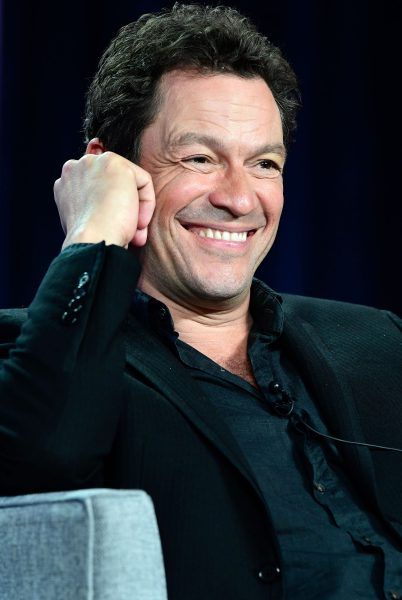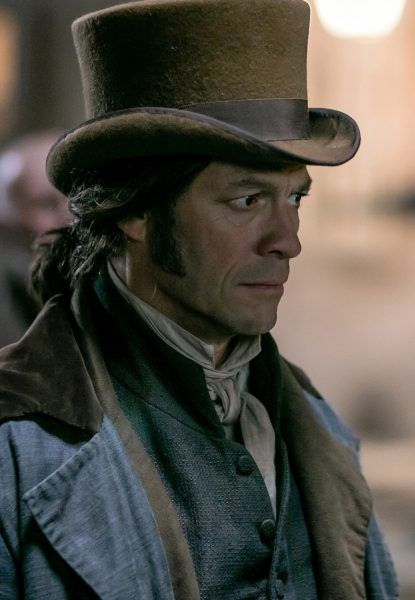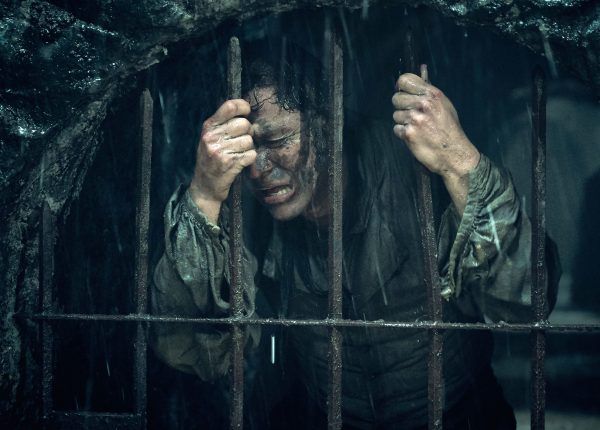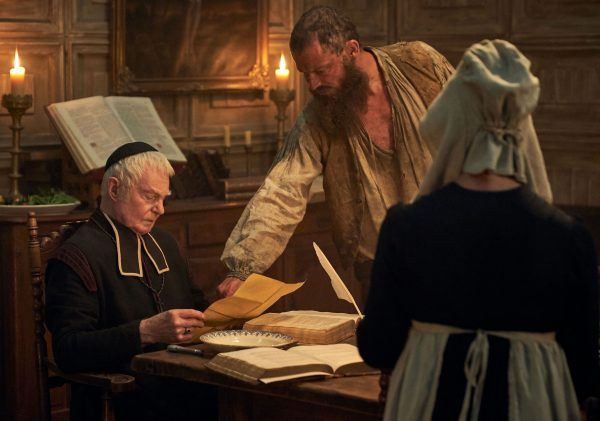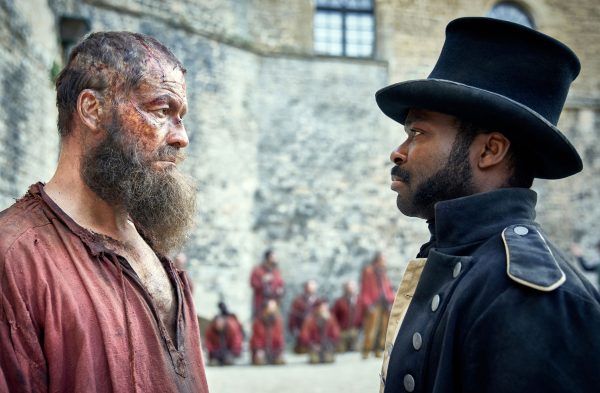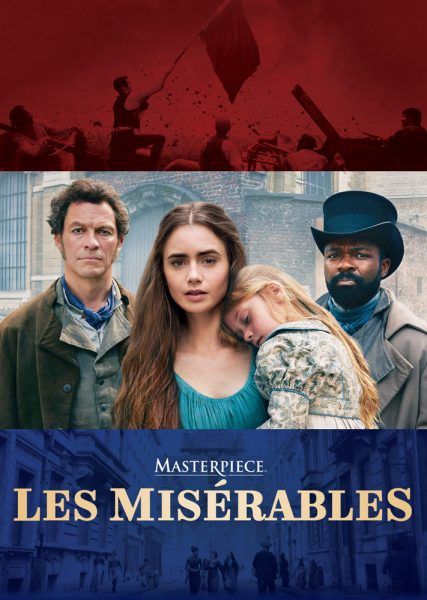From award-winning screenwriter Andrew Davies, the latest dramatic adaptation of Les Misérables (airing on Masterpiece on PBS) is a six-part epic story that delves deep into the many layers of Victor Hugo’s classic story. Exploring the cat-and-mouse relationship between Jean Valjean (Dominic West) and Javert (David Oyelowo) with a modern relevancy in its powerful themes, plotting, and characterizations, it’s all set against the backdrop of France at a time of civil unrest.
During this 1-on-1 interview with Collider, actor Dominic West talked about taking on such an epic story, which other actor’s performance of Valjean he checked out, why he enjoyed the shoot so much, how relevant the material still is, working with such a talented cast, the complex dynamic between Jean Valjean and Javert, and why his character is cooler than any superhero. He also talked about what attracts him to a project, and how he’d like to play more heroes than villains, at this point in his career.
Collider: This is certainly one of those roles that you just can’t say no to. But at the same time, do you also have to think a lot about it because it is so iconic?
DOMINIC WEST: Of course, you do because so many people have done it before, and done it really well, and we just had the musical movie. I was like, “No, I don’t want to do that.” And then, I read the book, and I think it’s the best book ever written. It’s better than Tolstoy. It’s epic and great, and it can bear any number of interpretations. There’s so much in the book, and it’s on such an epic scale, that it deserved a six-hour outing, rather than an hour and a half.
That must be such a gift, as an actor, to get six hours to explore these characters and really let the audience get to know them.
WEST: Yeah. There was initial reservation when it aired in England of, “Why do we want to watch this again?” And then, people who didn’t like the musical went, “Oh, this is actually a great story.” And people who loved the musical went, “Oh, we get more backstory on our favorite characters.” Having the book while we were making the show was extraordinary. For every scene, I’d go back to the book, and I could get four pages on exactly what Valjean was thinking, at that time. It was an incredible resource to have. We very much relied on the book, which is closer than the musical.
Did you just stick with the book and the script? Did you make sure not to look back at anyone else’s performances?
WEST: I checked out Liam Neeson. He was the only one I could find. But, there wasn’t much point. Normally, I would just avoid anyone else’s performances because you worry that you’ll then do something that’s not your instinct, but I didn’t really worry about that. I watched whatever I could, but I didn’t get much from it. Ultimately, there hasn’t been an English language TV adaptation since the 1960s, and there wasn’t much to compare this script with because it was six hours instead of two.
When you read these scripts, did you have a moment where you were like, “How are they going to make this look as big as and epic as it is on paper”?
WEST: Yeah, it opens at the battle of Waterloo, and on a budget that is roughly half of what you would get for an American pilot, really. It does the battle of Waterloo, goes to the streets of Paris, and has incredible floating prison hulks. It’s not something that you can do on the cheap.
It seems like with a project like this, when it’s done, you would want to just take a vacation from work. Did you want to just go sit on a beach somewhere, after shooting this?
WEST: Yeah, I did exactly that. Actually, it was so enjoyable, for the most part. I was living in Brussels, which is really quite a nice town with great restaurants. If just makes all the difference to your work, if it’s something you can believe in and that you think is a story worth telling because you don’t get that, that often. I haven’t had that often, in my life, where you really love your character and believe the story that’s being told is important, and that humanity needs to hear this story, however many times. That was definitely the case with this, and that changes everything. That means you relish the challenges and discomforts. It’s when you’re bored out of your mind, doing irrelevant trash, that isn’t really gonna change anything in anyone’s lives, that it’s hard.
Are you surprised about how relevant this material still is, no matter how many years seem to pass?
WEST: Yeah, and Victor Hugo said, “So long as there is poverty, this story will have meaning.” He probably thought there wouldn’t be any poverty, 150 years later, but of course, there is, and it does have an extraordinary resonance. The thing about this story is that it has an extraordinary effect on people. It really does get people in their core, and for lots of obvious reasons. It’s about the human spirit, under intense pressure and hardship.
What was it like to work with this incredibly diverse cast?
WEST: It was amazing. You can’t really make a show about people in poverty, or people on the lower levels of society, the disenchanted and disenfranchised, and the poor, certainly in the Western world, without having a lot of brown and immigrant faces. That would be ludicrous. And Paris was not all white, even then. It never has been. But it was really top talent, in the cast. Lily [Collins] really set the tone. We first met at 5:00 in the morning, in a freezing cold Belgian manor house, where it was at least -5 and there was no electricity because the crew hadn’t arrived, and she had to do her death scene, which is a really fucking hard scene. She brought it, on day one, and that set the bar for everyone. You suddenly realize, “Okay, we’re in serious acting territory here. This is weapons grade stuff.”
What did you enjoy about the dynamic between Jean Valjean and Javert, and working with David Oyelowo?
WEST: I thought he was being unfriendly. I kept inviting him and saying, “Do you want to come up for a drink or dinner, or something?” And he kept saying no. I thought, “Well, he’s not very friendly, is he?” And then, at the end, we had this brilliant night and I said, “We should have done this before.” And he said, “I was avoiding you. I didn’t want to get to know you. I’m your nemesis.” I went, “Oh, right, yeah, of course.” He didn’t want us to be relaxed together, which was dead right. I never think about these things, but it worked. The first question that I asked in our rehearsals was, “What the hell is Javert’s problem? What’s his beef with this guy? Why is he so obsessed with him?” And my answer was, he’s in love with him. It’s the fascination that the devil has for the angel, like Trump has for Obama. It’s that curiosity that the psychopath has for someone who has a human heart. Javert is such a hard part because it’s difficult to understand that mind-set, where the law and order is so important to your world view. It’s that mind-set that is very difficult to understand, but that’s what Javert is. He’s a guy who is affronted by lawbreakers and by people that he considers illegal, and it’s an interesting and horrifying mind-set to have. It’s making up for a deep, deep, deep sense of grievance, and I think David gets that across quite well.
What were you most excited about getting to explore with this character, and what did you see as the biggest challenges with him?
WEST: He’s much cooler than any superhero. No other superhero did 19 years in a French forced labor camp. He’s tough. The first thing was, “Fuck, how do you get to be that tough?” But psychologically, the difficult thing for me was that I didn’t understand why he felt so guilty, why he felt so worthless, why he kept surrendering himself back to Javert, and why he didn’t feel he was worthy of anyone’s love, or of happiness. Fortunately, I haven’t really had that in my life. That was the biggest leap, trying to get into the mind of someone who’s been incarcerated for a long time, and brutalized, and made to feel that they’re worthless. Tom Shankland, the director, kept saying, “It’s his guilt. He feels incredibly guilty.” I didn’t understand what he meant. How can you feel guilty about stealing a loaf of bread and getting 19 years in jail for it? Surely, you just feel righteous anger. So, the hardest part was getting into that mentality of a persecuted soul.
Were you also able to find ways to enjoy the experience?
WEST: Oh, I loved playing him. He was great. The whole prisoner stuff looks pretty grim, but it was brilliant fun to do. And then, there was lots of riding horses, which I love doing. And that court scene was just brilliant. It’s such meaty stuff. It’s a joy when you get great material and great people to do it with.
At this point in your career, what excites you about a project?
WEST: That’s an interesting question. It’s the location and who the other actors are, really. But in terms of material, what playing Valjean really showed me is that I play a lot of villains and bad guys. They’re rarely wholly bad, but I had a year where I played Fred West, who’s the biggest serial killer in the UK, ever, and Iago, and someone else. I did enjoy it, but I don’t want to do that anymore. I’m too old. Although it’s easy to make evil dramatic, and the devil is easy to make funny and interesting, and it’s very hard to make virtue funny or interesting, I’m much more interested in living with a virtuous character and in virtue than I am in evil. Evil is actually quite boring. The defining feature of real evil is blandness. As I get older, I want to have less and less to do with it.
Are you finding stuff that meets your new criteria?
WEST: No, I’m still being asked to play philandering cads. My next part is gonna be awful, as well. They tend to be villains who are not wholly evil because there’s always complexity in everyone, but I’m hoping this will open a few more doors for heroes. It’s great playing heroes. It nourishes your soul to play people who are great.
What are you doing next?
WEST: After I finish up Season 5 of The Affair, then I’m actually going on a road trip with my wife and kids for three months, up to the Pacific Northwest, because we decided to take a sabbatical. And then, I’m doing a film, called Gypsy Boy, which is a wonderful book that was written five years ago, about a boy who’s born into a bare-knuckle fighting family. He’s gay and doesn’t want to fight, and has to escape his monstrous bare-knuckle fighting dad, played by me.
The finale of Les Misérables airs on Masterpiece on PBS on May 19th.


